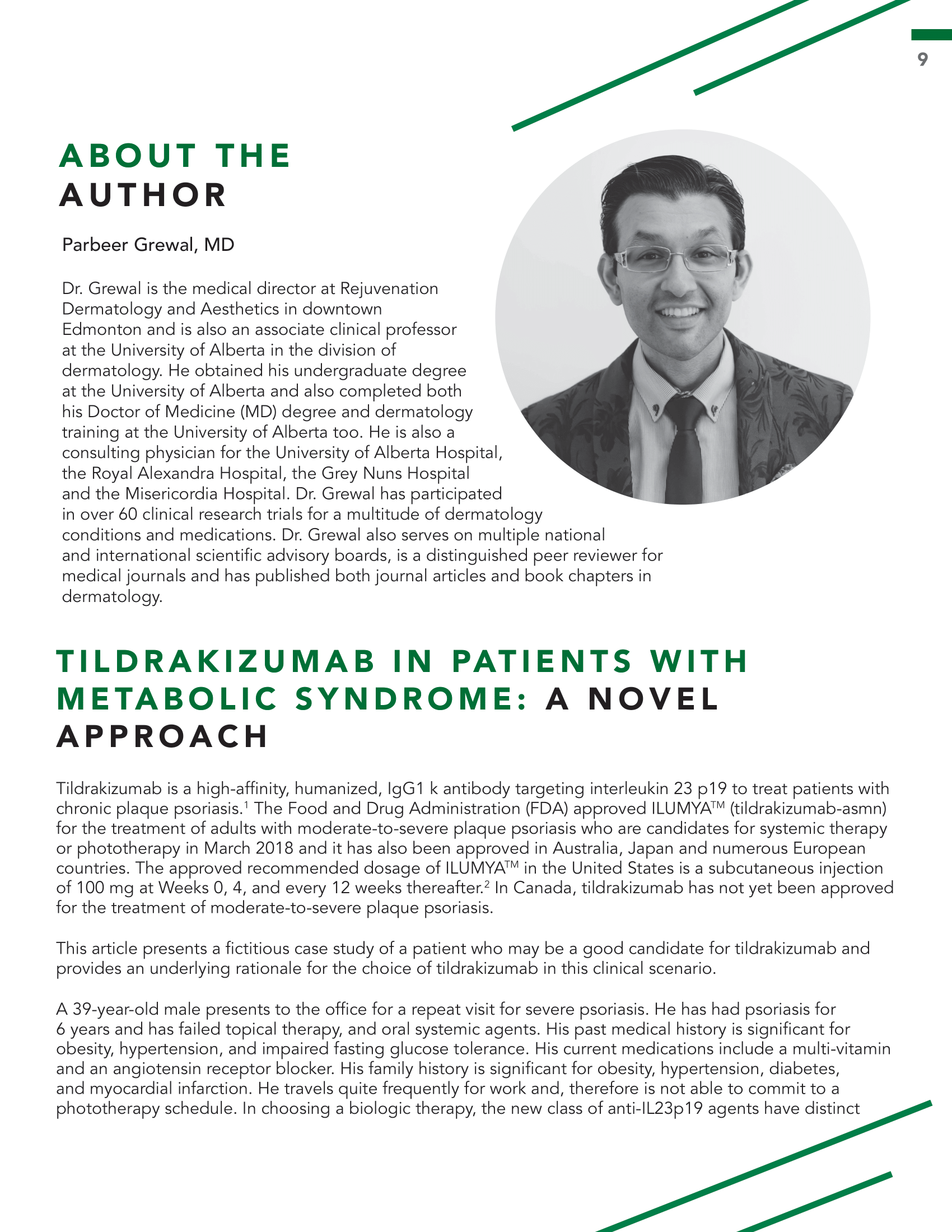Tildrakizumab in patients with metabolic syndrome: A novel approach
Abstract
Tildrakizumab is a high-affinity, humanized, IgG1 k antibody targeting interleukin 23 p19 to treat patients with chronic plaque psoriasis. The Food and Drug Administration (FDA) approved ILUMYATM (tildrakizumab-asmn) for the treatment of adults with moderate-to-severe plaque psoriasis who are candidates for systemic therapy or phototherapy in March 2018 and it has also been approved in Australia, Japan and numerous European countries. The approved recommended dosage of ILUMYATM in the United States is a subcutaneous injection of 100 mg at Weeks 0, 4, and every 12 weeks thereafter. In Canada, tildrakizumab has not yet been approved for the treatment of moderate-to-severe plaque psoriasis.
This article presents a fictitious case study of a patient who may be a good candidate for tildrakizumab and provides an underlying rationale for the choice of tildrakizumab in this clinical scenario.
A 39-year-old male presents to the office for a repeat visit for severe psoriasis. He has had psoriasis for 6 years and has failed topical therapy, and oral systemic agents. His past medical history is significant for obesity, hypertension, and impaired fasting glucose tolerance. His current medications include a multi-vitamin and an angiotensin receptor blocker. His family history is significant for obesity, hypertension, diabetes, and myocardial infarction. He travels quite frequently for work and, therefore is not able to commit to a phototherapy schedule. In choosing a biologic therapy, the new class of anti-IL23p19 agents have distinct clinical advantages that may be beneficial for this type of patient.
References
Galluzzo M, et al. “Tildrakizumab for treating psoriasis.” Expert opinion on biological therapy. 2017;17(95):645-657.
FDA product monograph tildrakizumab; www.accessdata.fda.gov/drugsatfda_docs/label/2018/761067s000lbl.pdf
FDA product monograph ustekinumab; https://www.accessdata.fda.gov/drugsatfda_docs/label/2016/761044lbl.pdf
FDA product monography Risankizumab; https://www.accessdata.fda.gov/drugsatfda_docs/label/2019/761105s000lbl.pdf
Reich K, et al. “Long-term efficacy and safety of tildrakizumab for moderate-to-severe psoriasis: pooled analyses of two randomized phase III clinical trials (re SURFACE 1 and re SURFACE 2) through 148 weeks.” British Journal of Dermatology. 2020;182(3):605-617.
Gordon KB, et al. Phase 3 Trials of Ixekizumab in Moderate-to-Severe Plaque Psoriasis. N Engl J Med. 2016;375:345-356.
Reich K, et al. “Tildrakizumab versus placebo or etanercept for chronic plaque psoriasis (reSURFACE 1 and reSURFACE 2): results from two randomised controlled, phase 3 trials.” The Lancet. 2017;390(10091):276-288.
Puig L. “Cardiometabolic comorbidities in psoriasis and psoriatic arthritis.” International journal of molecular sciences. 2018;19(1):58.
Mehta N, et al. “Attributable risk estimate of severe psoriasis on major cardiovascular events.” The American journal of medicine. 2011;124(8):775-e1.
Arnd J, Rustenbach SJ, Augustin M. “Comorbidity as a predictor for drug survival of biologic therapy in patients with psoriasis.” International journal of dermatology. 2016;55(3):296-302.
Gottlieb, et al. “Effect of metabolic syndrome on efficacy and safety in patients with psoriasis treated with etanercept or tildrakizumab: Post hoc analysis of 2 phase 3 clinical studies (reSURFACE 1 and reSURFACE 2)”; Presented at the 28th European Academy of Dermatology and Venerology (EADV) Congress. 2019 October 9–13. Madrid, Spain.
Gottlieb, et al. “Tildrakizumab Efficacy by Metabolic Syndrome Status in Psoriasis: Post Hoc Analysis of 3-Year Data from the Phase 3 reSURFACE 2 Study”; Presented at the 28th European Academy of Dermatology and Venerology (EADV) Congress. 2019 October 9–13. Madrid, Spain.
Lebwohl, et al. “ Relationship of Serum Glucose to Efficacy and Safety of Tildrakizumab Treatment for Psoriasis in Patients With and Without Metabolic Syndrome from reSURFACE 1 and reSURFACE 2”; Presented at the 28th European Academy of Dermatology and Venerology (EADV) Congress. 2019 October 9–13. Madrid, Spain.
Lebwohl, et al. “Tildrakizumab Efficacy by Metabolic Syndrome Status in Psoriasis: Post Hoc Analysis of 3-Year Data from the Phase 3 reSURFACE 1 Study”; Presented at the 28th European Academy of Dermatology and Venerology (EADV) Congress. 2019 October 9–13. Madrid, Spain.
Dufour J, et al. “Recent Advances in Evaluating Impact of Biologic Therapy for Moderate-Severe Psoriasis on Cardiovascular Events and Atherosclerotic Plaque Formation.” Journal of Cutaneous Medicine and Surgery. 2020;24(2):209-210.
Youssef AE, et al. “Coronary artery plaque characteristics and treatment with biologic therapy in severe psoriasis: results from a prospective observational study.” Cardiovascular research. 2019;115(4):721-728.
Menter MA, Mehta NN, Lebwohl MG, et al. “The Effect of Tildrakizumab on Cardiometabolic Risk Factors in Psoriasis by Metabolic Syndrome Status: Post Hoc Analysis of Two Phase 3 Trials (ReSURFACE 1 and ReSURFACE 2)”. J Drugs Dermatol. 2020;19(8):703-708. doi:10.36849/JDD.2020.5337.
Lebwohl MG, Leonardi CL, Mehta NN, et al. Tildrakizumab efficacy and safety are not altered by metabolic syndrome status in patients with psoriasis: Post hoc analysis of 2 phase 3 randomized controlled studies (reSURFACE 1 and reSURFACE 2). J Am Acad Dermatol. 2020;82(2):519-522.
Alice BG, Dann F. “Comorbidities in patients with psoriasis.” The American journal of medicine. 2009;122(12):1150-e1.


